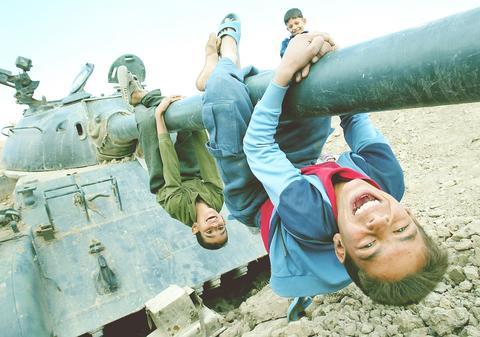As the US pledged to hand power to Iraqis faster, the Pentagon said yesterday that did not mean pulling out troops before they crushed guerrillas who fight on, seven months after the fall of former president Saddam Hussein.
"There is no decision to pull out early. Indeed quite the contrary," Secretary of Defense Donald Rumsfeld said while the US occupying forces launched new "Iron Hammer" strikes on suspected resistance positions around Baghdad.
"We will stay there as long as necessary," he told troops in the Pacific.

PHOTO: REUTERS
He denied Washington and its allies were in trouble after a particularly bloody few weeks in Iraq and insisted they were winning, despite an increasing number of guerrilla attacks.
Arriving in Japan, which is suffering cold feet about sending troops to Iraq after a bomb killed 18 Italians on Wednesday, Rumsfeld met Prime Minister Junichiro Koizumi. He is also due in South Korea, which is reviewing its offer of troops.
Rumsfeld was expected to press Washington's case to its allies for help in stabilizing Iraq to relieve the military and financial burden on the US as President George W. Bush seeks re-election a year from now.
Opinion polls show declining support among American voters for the occupation and growing disillusionment about the way the March invasion has turned out. Bush said on Thursday he wanted to "encourage the Iraqis to assume more responsibility."
US officials have not spelled out how this will be done, saying Iraq administrator Paul Bremer would discuss details with the Iraqi Governing Council on his return to Baghdad after this week's urgent consultations in Washington.
Postwar attacks that have killed 156 US soldiers, along with suicide bombings like Wednesday's assault on an Italian military base, have prompted what US General John Abizaid calls a "sense of urgency" about military efforts in Iraq.
The US military disclosed that Abizaid, leading those efforts, was planning to move back to the Gulf state of Qatar from Central Command headquarters in Florida.
In a fresh guerrilla attack, a roadside blast wounded two American soldiers in southern Baghdad yesterday morning.
Heavy gunfire and explosions had echoed across Baghdad during the night as US forces pursued Operation Iron Hammer against suspected guerrilla targets for a second day.
US forces destroyed a former Republican Guard building they said resistance fighters used to launch attacks and struck more suspected mortar and rocket-launch sites.
A missile fired from a AC-130 Spectre gunship flattened part of the building, leaving a tangle of metal and debris.
"Our unit has been taking fire from this building for several days so that's why we attacked," a US officer on the scene said.

DAREDEVIL: Honnold said it had always been a dream of his to climb Taipei 101, while a Netflix producer said the skyscraper was ‘a real icon of this country’ US climber Alex Honnold yesterday took on Taiwan’s tallest building, becoming the first person to scale Taipei 101 without a rope, harness or safety net. Hundreds of spectators gathered at the base of the 101-story skyscraper to watch Honnold, 40, embark on his daredevil feat, which was also broadcast live on Netflix. Dressed in a red T-shirt and yellow custom-made climbing shoes, Honnold swiftly moved up the southeast face of the glass and steel building. At one point, he stepped onto a platform midway up to wave down at fans and onlookers who were taking photos. People watching from inside

A Vietnamese migrant worker yesterday won NT$12 million (US$379,627) on a Lunar New Year scratch card in Kaohsiung as part of Taiwan Lottery Co’s (台灣彩券) “NT$12 Million Grand Fortune” (1200萬大吉利) game. The man was the first top-prize winner of the new game launched on Jan. 6 to mark the Lunar New Year. Three Vietnamese migrant workers visited a Taiwan Lottery shop on Xinyue Street in Kaohsiung’s Gangshan District (崗山), a store representative said. The player bought multiple tickets and, after winning nothing, held the final lottery ticket in one hand and rubbed the store’s statue of the Maitreya Buddha’s belly with the other,

Japan’s strategic alliance with the US would collapse if Tokyo were to turn away from a conflict in Taiwan, Japanese Prime Minister Sanae Takaichi said yesterday, but distanced herself from previous comments that suggested a possible military response in such an event. Takaichi expressed her latest views on a nationally broadcast TV program late on Monday, where an opposition party leader criticized her for igniting tensions with China with the earlier remarks. Ties between Japan and China have sunk to the worst level in years after Takaichi said in November that a hypothetical Chinese attack on Taiwan could bring about a Japanese

‘COMMITTED TO DETERRENCE’: Washington would stand by its allies, but it can only help as much as countries help themselves, Raymond Greene said The US is committed to deterrence in the first island chain, but it should not bear the burden alone, as “freedom is not free,” American Institute in Taiwan Director Raymond Greene said in a speech at the Institute for National Defense and Security Research’s “Strengthening Resilience: Defense as the Engine of Development” seminar in Taipei yesterday. In the speech, titled “Investing Together and a Secure and Prosperous Future,” Greene highlighted the contributions of US President Donald Trump’s administration to Taiwan’s defense efforts, including the establishment of supply chains for drones and autonomous systems, offers of security assistance and the expansion of